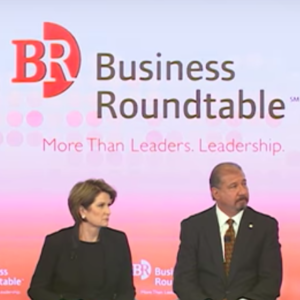Editor’s Note: For an alternative viewpoint, see Counterpoint: How Profit and Purpose Can Co-Exist
Only the most extraordinarily dogmatic and doctrinaire would suggest that corporations are responsible only to their shareholders.
So, when a group of giant corporation CEOs this month proclaimed that companies owe a duty to all “stakeholders,” of course it marked a step forward. But let’s be real about why this happened and how little it’s likely to mean in practice.
For the last 40 years, the doctrine of “shareholder primacy” has displaced the common sense understanding that companies owe a duty to workers, consumers, their communities and the planet. The result has been a focus on increasing quarterly profits at all costs.
And the costs have been severe: Gone are good pension plans and long-term employment commitments. Businesses have outsourced millions of jobs and broken unions and cut wages for the jobs that remain.
Always hostile to regulation, Big Business has waged an unrelenting campaign to roll back even modest consumer, environmental and other regulatory protections — even though the cost of the rules, once in place, are virtually never as expensive as corporations had claimed. Reckless deregulation gave us the 2008 Wall Street crash and the Great Recession; the BP oil disaster in the Gulf of Mexico; the Boeing 737 Max crashes; and an unimpeded rush to climate catastrophe.
Directly due to the shareholder primacy theory — and supercharged by President Trump’s massive tax giveaway to Big Business — giant corporations are now spending $1 trillion a year on stock buybacks. The aim is to jack up share prices — directly at the expense of better compensating employees or making long-term investments in research and development.
Did the CEOs who signed the “purpose of a corporation” suddenly have an epiphany that things are going horribly wrong?
Did they suddenly become “woke”?
They did not.
Instead, they are responding to the growing public outrage about staggering wealth and income inequality, demands for far-reaching measures to avert the worst climate crisis scenarios, and a cross-partisan public belief that the political and economic systems are rigged to favor the corporate class.
Recognizing that the CEOs acted only in response to rising public anger should lead us to be very skeptical that the statement is anything more than a PR stunt. Their “leadership in action” examples include lots of nice things that companies are doing — assisting employees pay for higher education, facilitating employee volunteer service, making grants to employees in financial crisis, donating to hurricane relief — but absolutely nothing that is systemic.
If the CEOs really want to show their social commitment, the first thing they should do is: Stop doing harm. For example:
—Stop blocking employees from unionizing.
—Stop designating your workers as “contractors” instead of employees — and give them the pay, benefits and Social Security tax payments they deserve.
—Stop scheming to dodge the taxes you owe, and stop lobbying for tax cuts.
—Stop blocking desperately needed legislation to combat the climate crisis.
—Stop pushing for dangerous deregulation.
—Stop pushing for trade deals that lock in high drug prices, facilitate job offshoring, endanger food safety and empower corporations to sue governments over “lost profits.”
—Stop using the fine print in consumer and employee contracts to prevent consumers and workers from joining together in lawsuits and get their day in court when corporations injure them.
—Stop ripping off patients with monopolistic price gouging for prescription drugs.
—Stop fighting people’s right to health care and Medicare for All.
—Stop breaking the law as so many corporations frequently do.
—Stop corrupting our democracy by drowning it in Big Money.
Unfortunately, there’s little reason to expect the CEOs to do any of this. Indeed, the Business Roundtable — the CEO group that organized the “purpose of a corporation” statement — features on its website policy positions favoring tax cuts for corporations, support for the flawed NAFTA 2.0, super-aggressive deregulatory action (apparently, the Trump administration, the most deregulatory in history, still hasn’t done enough!) and calls for expanding investment in oil and gas.
Signers of the statement on “stakeholders” include CEOs leading many of the companies that have done the most damage to the United States in recent years, including Wall Street executives (JPMorgan Chase, Bank of America, Goldman Sachs); BP and other oil companies including ExxonMobil and Chevron; Boeing; and drug makers Pfizer and Abbott.
There are no asterisks next to their names signifying acknowledgment for past wrongdoing.
Let’s appreciate the very modest step forward the CEOs have been forced to take. But then let’s intensify our pressure to hold them to their word and truly make them accountable.

